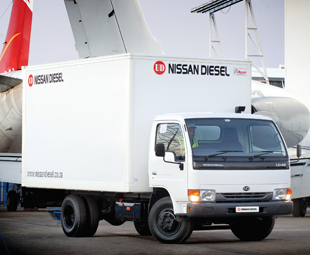Trucking evolutions

Trucks are the backbone of the commercial transport sector, and as such must be able to give operators precisely what they and their businesses need. Which is why Nissan Diesel SA has always concentrated on being evolutionary, rather than revolutionary.
“It’s a simple formula when you get down to it,” explains Rory Schulz, general manager: corporate planning and marketing at Nissan Diesel SA (NDSA). “Transport operators do not need revolutionary products, they need the right products for their specific requirements, and that is achieved through careful planning and product tweaks until you have the perfect product.
“Then, as local requirements change, or something slightly new or different is needed, the design of the product follows suit. It really is an evolutionary process.”
According to Schulz, customers have three core requirements: they want their trucks to offer improved performance while still being affordable; to be easy and cost effective to maintain; and to be fuel efficient.
“If as a manufacturer you can offer all of the above – and we do – you will be successful in the commercial transport sector,” he says.
“At Nissan Diesel, we offer appropriate technology for South African conditions that can be supported.” In other words, Nissan Diesel’s product range is in tune with what the local market can sustain. Its Euro 2 engines suit the level of fuel technology available to transport operators and truck drivers, and the technology employed in the engine and driveshaft designs suit local skills levels as well.
“Our product planning strategies always advance at a rate that the local market can accept,” explains Schulz. “We also modify or even change certain specifications to meet South African conditions, which are obviously quite different to those in Japan or even Europe.”
In addition, as the market itself changes, so too must the product. “As you participate in a market, things will change. The important thing, for manufacturers and customers alike, is to move with these changes. Take them and make them your own, make them work for your product design and for your customers,” says Raymond Schulz, manager: marketing and retail services, NDSA.
 According to Vic Capitani, general manager: engineering at NDSA, a typical launch of a new product to the local market takes between 18 and 24 months to finalise. “While we have always believed in keeping the good aspects of our products alive and present in our new models, we are also continuously working on improving our designs, perfecting them for the next launch of each of our ranges,” he says.
According to Vic Capitani, general manager: engineering at NDSA, a typical launch of a new product to the local market takes between 18 and 24 months to finalise. “While we have always believed in keeping the good aspects of our products alive and present in our new models, we are also continuously working on improving our designs, perfecting them for the next launch of each of our ranges,” he says.
“If something works, we see no point in changing it, but rather trust in some designs that have quite literally stood the test of time. But, if anything is not working for an operator or driver, or there is any room for improvement in a particular design, you can be sure we will find a solution to the problem. We are very good at resolving any problems we encounter, largely because we keep our finger on the pulse of the local transport market.”
In fact, Nissan Diesel prides itself on exceptional customer relations, from both a head office and dealer network perspective. “We work closely with Japan to design the ideal products for our local working conditions,” explains Capitani. “How would we know which areas needed work without solid input from the men who drive and work with our products on a daily basis? After all, it’s them who we need to please.”
This market feedback has allowed Nissan Diesel to design a product range that is ergonomic and comfortable, yet affordable.
“Our vision is to be the manufacturer who provides the lowest life cycle costs in the market,” confirms Rory Schulz. “And we are constantly asking ourselves if we are in fact living up to this vision and giving our customers what they need, because after all, that’s why we are here.”
Nissan Diesel SA’s proven durability and reliability, supported by dedicated South African specifications, full support from Nissan Diesel in Japan, and a strong local dealer network, ensures that customers are getting the right product for a job.
Published by
Focus on Transport
focusmagsa




